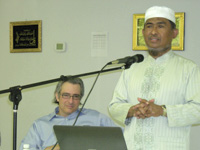By Manny Frishberg, JTNews Correspondent
In the hypercharged atmosphere of Middle Eastern conflicts and the war on terror, it would be easy to assume that Jews and Muslims have little in common. But in reality, nothing could be further from the truth. Many of the practices of Islam and Judaism are remarkably similar, rooted in some of the same Semitic culture and traditions. Both Jews and Muslims are “people of the Book” — deriving their spiritual teachings from the written word, and Islam even reveres the Tanach as one of great sources of the word of God.
It was in that spirit, and as part of an inquiry into what the two religions share and where they diverge, that Rabbi Daniel Weiner of Temple De Hirsch Sinai and Imam Mohamad Joban came together at the Masjid Ar-Rahmah (Muslim Association of Puget Sound) in Redmond on July 20 for a public talk about the patriarch Abraham in the two traditions.
The Muslim Association of Puget Sound was founded in 2006 to promote Islamic educational, social and cultural services to the Muslim community in the region and to promote the teachings of Islam. MAPS provides religious services and activities to build links between families, businesses and organizations, and is committed to helping the needy.
As part of its mission, the organization works to promote interfaith dialogue and help its members better understand the other religions practiced in the area. Following their evening prayers, more than two dozen MAPS members, who come from more than 20 countries, both Arab and non-Arab, settled in to listen to the rabbi and the imam talk about the man who brought monotheism to the ancient world.
Relying on Midrashim and the Torah as sources, Rabbi Weiner talked about Abraham and the origins of Judaism.
“Noah,” Rabbi Weiner said, “was considered to be the most religious person of his time, and Abraham was considered to be the most religious person of his time.”
But, while it was not such a big thing to be “the most religious person” at a time when people had turned their backs on God and descended into wicked ways — as we are told was the case in Noah’s age — it was more of a feat in an era when people were engaged in their religions and devoted to worshipping their gods, as was true in Abraham’s time.
Weiner described Abraham as “the first Jew” but, more importantly, “a religious visionary” for believing in a single, all-powerful God in a time and place where the universal practice was to worship a variety of local deities, each responsible for some particular aspect of daily life.
These included fertility gods, weather gods, agricultural gods, and so on. According to the writings, Abraham’s father was a seller of statues of these various gods.
“It was an incredible leap of faith,” Weiner said, “to see that God transcended the material.”
Explaining that “the Torah doesn’t give us any background about Abraham as a young person, so the rabbis filled in the blanks,” he told a story from the Midrash about the young Abraham smashing his father’s idols — all except the largest of them. When his father demanded an explanation, Abraham told him that a woman had come with an offering of flour, and the idols had quarreled about who would eat first. When his father responded that they were mere statues and could not have fought that way, Abraham responded that his father should listen to what he himself had said.
When it was his turn to speak, Imam Joban recited a passage from the Koran, which told a very similar story.
“Why do you worship these gods,” the Koran quotes Ibrahim (as the name is rendered in Arabic) asking his father, “who can neither hear nor help you?”
Throughout his talk, the imam, who grew up in Indonesia and received his Master’s degree in Islamic Studies from the University of Cairo, introduced his statements by singing the relevant verses from the Koran, in a way reminiscent of a cantor at a Jewish service. Using a PowerPoint presentation, he showed the passage in Arabic and English translation while he spoke.
Where the stories of Abraham diverged was when they came to the moment when God ordered his servant to sacrifice his son. In the Jewish version, the son in question was Isaac, Abraham’s son by his first wife, Sarah, while in the Islamic version, it was his first-born by Sarah’s handmaiden Hagar who he was called upon to sacrifice. But both versions, however, ended in the same way, with God rescinding the commandment, and both religious leaders agreed that the message was one of devotion and surrender to the will of God.
In the Jewish tradition, the children of Isaac formed the basis of the Jewish people and the prophets were all descended from his line. Muslims trace the messenger Mohammed, the founder of their religion, back through the lineage of Ishmael.
When one person from the audience asked why, if Abraham was called upon to sacrifice “the righteous son,” do the two religions tell different stories about which son was placed on the altar, both leaders had to work hard to give a satisfactory answer.
Imam Joban explained that in the Islamic version, it was the eldest son he was called on to sacrifice, as was common practice in that place and time. Rabbi Weiner took a different tact, comparing the disparate versions of the story to the Japanese film classic Rashamon, in which the same events are described differently by four different witnesses — with each holy book showing its own perspective.
